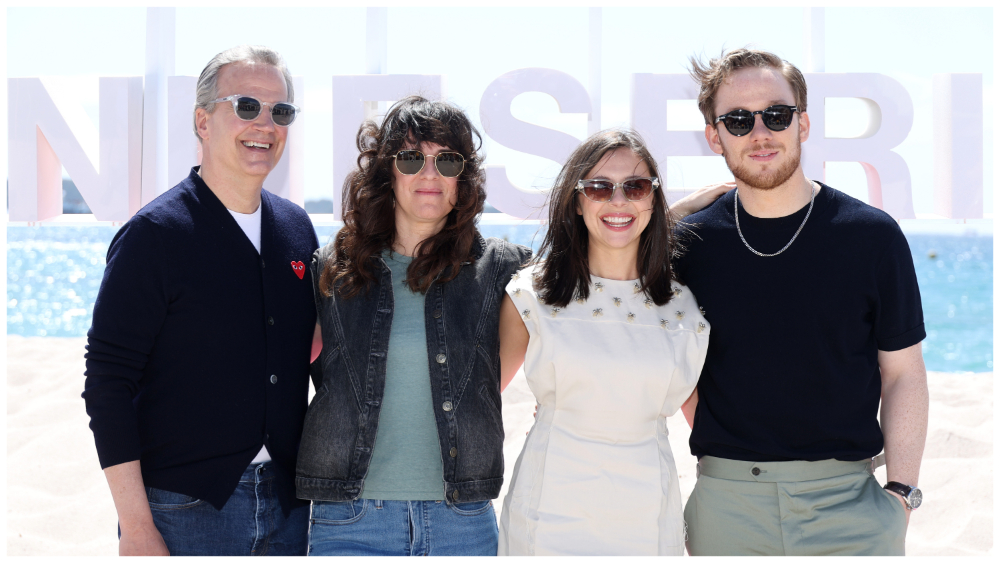
Miep Gies, as well as her husband Jan, helped hide Anne Frank and her family from the Nazis in Amsterdam, she also saved the girl’s diary. But she never considered herself a hero.
“She didn’t want to be put on a pedestal. Her mantra was: ‘I just did what human beings are supposed to do and helped someone in need,’” Bel Powley, who plays Gies in National Geographic series “A Small Light,” said Saturday at Canneseries. The international premiere of the first episode screened at the international series festival in Cannes, followed by an on-stage discussion.
Amira Casar, “Peaky Blinders” alumnus Joe Cole, Liev Schreiber and Billie Boullet also star in the eight-episode show, which was co-created by Tony Phelan and Joan Rater.
“Everybody feels like they know this story, know [about Anne] and the secret annex. But there is so much more to learn and this was just an incredible journey of learning,” Cole said.
“We were given freedom to be open and to have lightness. It’s a dark subject, but people are falling in love, getting married. The tulips are still blooming every year.”
“With period pieces, so often it can feel sepia-toned, dusty. You can feel distant from it,” Powley added.
“Here, it was always about connecting to these characters and their humanity. It’s just as much about them and their marriage as it is about what Hitler and Nazis were doing. It’s about the macro and about the micro.”
The series is directed by Susanna Fogel, alongside Phelan and Leslie Hope. She is also serving as one of the executive producers of the show, which is produced by ABC Signature and Keshet Studios.
“My mother had spent some time in Amsterdam, we travelled there a few times when I was growing up. I knew vaguely what Miep had done but I didn’t know she was hiding as many people as she was,” Fogel said.
“We all have the option of disengaging, escaping into our devices and ignoring what’s going on in the world. Even when you read about atrocities going on in different parts of the world, it’s just one item on a Twitter feed amongst a million memes.”
“Watching a relatable version of a hero makes people think it could be them, too. Miep is a hero when you think about the big picture, but on a smaller scale she is just a person who did something instead of not doing anything.”
During intense research, Phelan started to uncover little known details about the couple.
“We began to dig out all sorts of interesting facts. Jan was previously married and neither of them ever talked about it publicly. But in our telling, it just makes them more relatable,” he said, calling the show “a labor of love.”
“From scouting locations to shooting, I would constantly bump into [Holocaust] survivors. They are dying off, so I certainly feel the responsibility to keep telling this story in a new way, in a way that reminds people that this was not so long ago.”
“[The show] is meant to cause people to empathize with Miep and Jan, and ask themselves: ‘What would I do in these circumstances?’ Ask questions about what their parents or grandparents did during the war. Right now, in Amsterdam, they are releasing documentation about collaboration with the Nazis, which has been suppressed until now.”
With Powley devouring Gies’ autobiography (“She loved to go out dancing with her friends, she loved Mozart, she talked about fancying her husband. These were the things I could relate to as a young woman”) and her granddaughter visiting the team, it was still about making sure the show feels “lived-in and real,” Fogel said.
“We had a costume designer who had never done a period project before, but he had done these incredible, vibrant costumes for shows about twenty-something hipsters in Brooklyn. By making choices that are a little outside of the box, you get people to engage.”
Sadly, Miep Gies’ story is even more relevant today, she observed. Phelan added that contemporary conflicts, especially the war on Ukraine, were always on their mind.
“When we scouted Prague’s train station, half of it had become a refugee center,” Phelan said. “We had Ukrainian refugees working on the film shoot. It just brought home, in a very visceral, immediate way, the world in which we live in. And the perilous path that could be ahead.”
“There are other Mieps around, doing an incredible job in Ukraine, helping people in other warzones,” added Casar, cast as a “very progressive, modern” Edith Frank, Anne’s mother.
“What a joy it was to find out about both of them. A real life lesson.”











